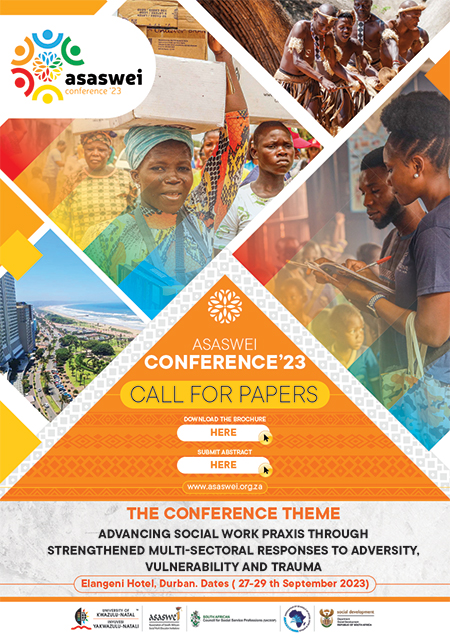The View page displays a submission's general information and data. Watch video
Submission information
Submission Number: 30
Submission ID: 30
Submission UUID: e54cb71c-73ab-4e1d-adcc-fff25313e999
Submission URI: /2023/abstracts
Created: Thu, 05/18/2023 - 20:38
Completed: Thu, 05/18/2023 - 21:05
Changed: Mon, 08/14/2023 - 16:37
Remote IP address: 41.1.65.227
Submitted by: Anonymous
Language: English
Is draft: No
Current page: Complete
Webform: Abstract
Presenters
Dr.
Nathane-Taulela
Motalelpule
University of the Witwatersrand
Dr Motlalepule Nathane is a Senior Lecturer in the department of Social Work at the University of the Witwatersrand. She is an academic researcher and holds a PhD in Social Work from the University of the Witwatersrand. She has over eighteen years of work experience in practice as a Social Worker and in the Institution of Higher Learning. Dr Nathane is a social feminist with a special interest in gender studies, African perspective of Families; Motherhood, Fatherhood, Decoloniality, Human Rights and Social Justice. She is one of the co-authors of a book published by HSRC titled Black Academic Voices: The South African Experience. Dr Nathane has extensive experience in mentoring and youth development.
No
Abstract
Gender-based Violence and Femicide Interventions- Perspectives from community members and activists in Evaton, South Africa
THEME 3: Strategies toward the normative development of society
SUB 3.1 Promoting egalitarianism in intimate and other relationships as responses to Gender-based violence and femicide
Oral Presentation
Globally, Gender Based Violence and Femicide (GBVF) remains a multifaceted social issue in the 21st century. Despite the ratification of international treaties and national laws, South Africa continues to have alarmingly high levels of GBVF, which were worsened during the Covid-19 national lockdown. Despite copious studies on GBVF, the voices of local community members and activists as key collaborators in such research have been excluded. This study used a mixed methods and included fourty (40) participants in a survey for the quantitative aspect as well as a qualitative aspect of the study. Community members participated in gender-specific focus group discussions, while activists had a focus group of their own to obtain data on interventions. Findings show that while the South African government has made strides in its efforts to eliminate GBVF, there are no sustainable community level programming and intervention aimed at changing social norms and toxic masculinity that perpetuate GBVF. In conclusion, we recommend that efforts be made to implement intervention initiatives that go beyond creating awareness on GBVF, but partner with local NGO-led organizations to engage in programming and intervention that is aimed at changing social norms.
Reviewer ONE Feedback
Prof
Glynnis
Dykes
Yes
Empirical Research
Accepted
Reviewer TWO Feedback
Prof
Annaline
Keet
Yes
Empirical Research
Accepted

